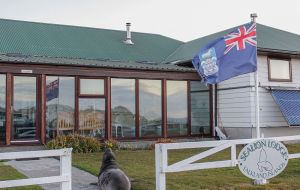MercoPress. South Atlantic News Agency
Falklands' Covid support paid out over a £1m; tourism expected to continue tied to the scheme
 The retail sector accounted for the largest share of the support payments, with 25 claims totaling £211,060.
The retail sector accounted for the largest share of the support payments, with 25 claims totaling £211,060.  The accommodation and food services sector was also among the hardest-hit sectors, receiving £164,973 in respect of 51 claims.
The accommodation and food services sector was also among the hardest-hit sectors, receiving £164,973 in respect of 51 claims. The Falkland Islands government, FIG, up to July 6, had paid out £1,016,570 for Covid support measures from the total approved funding of £8.99m. The figure, from a paper presented to the Executive Council does not include the wool clip purchase scheme, which is expected to total around £2.9m.
The paper also secured the continuation of several support schemes until the end of September. However, the service charge waiver and reduced electricity unit price will not be continued. According to a breakdown published in the paper, over half of the figure (some £620,679) has been spent on the employment/self-employment support scheme.
A total of £116,191 has been paid out in the job retention scheme, and £8,817 on the unemployment subsidy scheme. Direct grants up to that date totaled £39,467. The costs to FIG of the reduced electricity unit price and service charge waiver as of July 6 were £145,931 and £85,484 respectively.
The retail sector accounted for the largest share of the support payments, with 25 claims totaling £211,060.
The accommodation and food services sector was also among the hardest-hit sectors, receiving £164,973 in respect of 51 claims. Food and accommodation was the only sector to make significant claims under the job retention/furlough scheme. The construction sector meanwhile filed 67 claims to receive £139,218.
A breakdown of the reasons behind the claims shows that the overwhelming majority of claims (470 out of 592) were made in respect of non-essential workers who could not work from home.
Claims for such workers totaled £563,439.
Some 60 claims were filed in respect of workers classified as vulnerable by the King Edward Memorial Hospital, with support for those claims reaching £124,028.
The paper notes that there is likely to be continued demand for support measures, and notes that further, sector-specific measures are likely to be considered by Executive Council “in response to the differential effects of the pandemic on sectors such as tourism and fisheries. Analysis completed to date suggests that the effects of the pandemic on the tourism sector are likely to be particularly severe”
The paper notes that the figures originally budgeted were based on a cautious estimate that up to 50% of the population would become infected, that vulnerable people would have to self-isolate for a full three months, and that only half of the two groups would be able to work from home.
“The rapid containment of the outbreak on the Islands is the main reason for a substantial proportion of the economic measures budget being unused,” the paper concludes.
Finally it must be added that elected lawmaker MLA Teslyn Barkman revealed that contracts for the wool clip purchase scheme have been signed and the updated total paid
plus that which is committed is £2,778,125.11. (Penguin News)




Top Comments
Disclaimer & comment rulesCommenting for this story is now closed.
If you have a Facebook account, become a fan and comment on our Facebook Page!